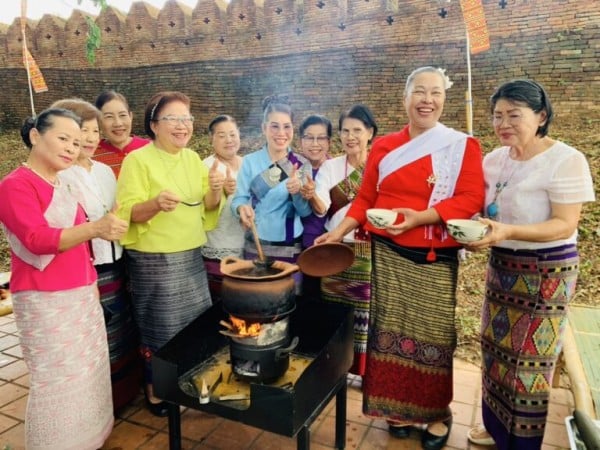
Newswise — Asst. Prof. Dr. Rukchanok Karcharnubarn, Dean of the College of Population Studies, Chulalongkorn University, together with Prof. Dr. Khamkom Pornprasert, Dean of the Faculty of Fine and Applied Arts, Chulalongkorn University, and the Center of Learning Network for the Region, led a research team on their second field visit to Nan Province from May 15–17, 2025, at the Nan City Wall and Wat Mongkol. They were joined by Assoc. Prof. Dr. Pornprapit Phoasavadi, Associate Dean for International Affairs, Faculty of Fine and Applied Arts; Dr. Nopphawan Photphisutthiphong, Associate Dean for Research, College of Population Studies; and Mr. Kittisak Ruangmun, a researcher from the College of Population Studies.
The goal of this initiative is to strengthen Nan’s cultural ecosystem to sustainably support an aging society. Providing opportunities for the elderly to participate continuously in social and cultural activities helps reduce social isolation and enhances self-worth. When the elderly engage in cultural activities regularly, it positively impacts their physical and mental well-being.
This model uses food culture as a key tool to bring the elderly together in group activities. Discussions were held on ways of life, traditional dance culture, and food culture related to health.
Edible plants commonly found growing along home fences are rich in medicinal properties—knowledge shared by Ajarn Yan Songmuangkaen, a local sage from Nan and recipient of the 2015 “National Artist Teacher Award” from the Sustainable Arts and Crafts Institute of Thailand (Public Organization). One highlight is “Kaeng Khae”, a nutritious local curry from Nan known for its health benefits. The main ingredient is the Sesbania flower (locally known as “dok khae”, while the leaves are called “cha-phlu” in Central Thailand).
“Kaeng Khae” is a traditional dish passed down through generations. Elders recall it as one of the four signature dishes served to honored guests by the rulers of Nan (Kaeng Khae, Kaeng Sanat, chili paste, and larb). Over time, it became a household dish made with easily accessible vegetables, including even tomato shoots. It consists of chili paste, meat, and fresh vegetables, seasoned with local herbs like Makwaen (Zanthoxylum), Tao-wan Cha Khrarn vine, and galangal flower, giving it a distinct aroma and taste that, despite being spicy, remains pleasantly mellow.
Ajarn Srisawat Patsamarn, president of the Nan Municipality Women’s Group, stated that members enjoy participating in the group’s diverse activities, especially cooking sessions organized by the local elderly school and Chulalongkorn University’s research team. Besides cooking, they also engage in “Fon Long Nan”, a traditional dance used as a form of exercise, and in group discussions. These activities promote physical strength, mental wellness, social bonding, and awareness of the nutritional and medicinal benefits of various foods.
This second field visit focused on data collection from the Nan Municipality Women’s Group, which has over 200 elderly members. The College of Population Studies and the Faculty of Fine and Applied Arts conducted in-depth research in Mueang District, Nan Province, inviting members to participate in activities aimed at understanding the elderly’s local context—generational gaps, income generation, time use, family caregiving, and intergenerational experiences within the changing social environment.
The visit resulted in greater collaboration with elderly women’s groups in Nan, helping reinforce intergenerational communication and cultural context, and delivering useful information about local foods and their benefits to the elderly. This process contributes to the sustainable strengthening of Nan’s cultural ecosystem.
The Faculty of Fine and Applied Arts, the College of Population Studies, and the Regional Learning Network Center will disseminate this integrative knowledge through a joint publication titled “Kin Hom Tom Muan”, co-developed by Chulalongkorn University, local sages of Nan, and elderly groups in the province. The first issue will feature “Kaeng Khae: Creative Food Culture”, focusing on local art and culture as a foundation for improving quality of life in a sustainable aging society.
